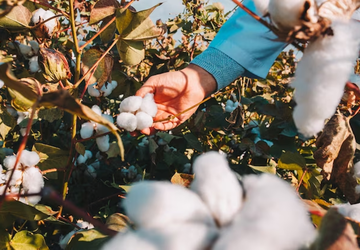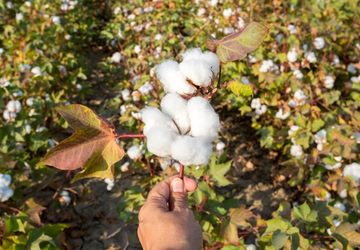Why Organic Cotton is Gaining Popularity
The global textile sphere is witnessing a significant pivot towards organic cotton, a trend powered by an increasing awareness of sustainable living. The preference for organic cotton trends is not merely a fleeting fashion fad; it's a conscious choice driven by understanding its far-reaching benefits for the environment and human health. The absence of harmful pesticides and synthetic fertilizers in its cultivation makes organic cotton standout for eco-conscious consumers.
The Multifaceted Benefits of Organic Cotton in Modern Lifestyle
One must acknowledge its manifold advantages to discuss the benefits of organic cotton. As the world grapples with environmental concerns, organic cotton emerges as a beacon of sustainability. It's grown using methods that have a lower environmental impact, especially concerning water pollution and soil degradation. This shift is crucial in the backdrop of global climate change, aligning perfectly with the organic cotton trends.

Organic Cotton's Role in Promoting Health and Wellbeing
Health-conscious consumers increasingly opt for organic cotton due to its hypoallergenic and chemical-free nature. This preference is particularly evident in clothing and accessories for infants and people with sensitive skin. Using organic cotton goes beyond personal health benefits and fosters a safer environment. Cultivating organic cotton encourages biodiversity and soil health and reduces the carbon footprint, which is crucial in today's environmentally conscious world.
Ethical Farming and Fair Trade: The Cornerstones of Organic Cotton
The ethical dimension of why organic cotton should be used must be balanced. By embracing organic cotton, the fashion industry supports farming practices that are not only environmentally sustainable but also socially responsible. This means fair wages and safer working conditions for farmers and workers, which resonate deeply with the modern, ethically aware consumer. This commitment to ethical practices forms a core part of the benefits of the organic cotton narrative.
The Revolution of Organic Cotton in Contemporary Fashion
In recent years, the fashion industry has witnessed a monumental shift towards organic cotton, driven by a growing global awareness of environmental and ethical considerations. This trend is not just about style; it represents a profound change in how consumers and manufacturers perceive material sourcing. Organic cotton trends are increasingly shaping the decisions of major fashion brands, reflecting a broader commitment to sustainability and responsible sourcing.
Health and Environmental Benefits: The Core of Organic Cotton's Appeal
The health and environmental benefits of organic cotton are at the forefront of its popularity. Unlike conventional cotton, organic cotton is grown without toxic chemicals, making it a safer choice for consumers and the environment. This aspect is crucial in light of the growing concerns about pesticide use and its impact on human health and ecosystems. Choosing organic cotton is a proactive step towards reducing ecological footprints and promoting sustainable farming practices.
Ethical Practices and Social Responsibility in Organic Cotton Production
A key factor in the rise of organic cotton is the emphasis on ethical practices in its production. Consumers are increasingly mindful of the conditions under which their clothing is made. The organic cotton industry often aligns with fair trade principles, ensuring that farmers and workers receive fair compensation and work under safe conditions. This ethical dimension is a significant component of the benefits of organic cotton, resonating with socially conscious consumers.
The Future of Organic Cotton in Sustainable Fashion
Looking ahead, the role of organic cotton in sustainable fashion seems set to grow even more. As consumers become more environmentally conscious, the demand for organic cotton trends will likely increase, encouraging more brands to adopt sustainable practices. The benefits of organic cotton extend beyond the environmental impact; they represent a move towards a more ethical and sustainable fashion industry, aligning with the values of the modern consumer.
The Sustainable Transformation in Textile Manufacturing
The rise of organic cotton in textile manufacturing marks a significant shift towards sustainable practices in the fashion industry. Unlike traditional cotton, organic cotton is produced without harmful pesticides and chemicals, making it a more environmentally friendly option. This shift reflects a broader trend towards sustainable production methods prioritizing ecological health and long-term resource management. As awareness about the detrimental effects of conventional cotton farming grows, the organic cotton trends are gaining momentum, driven by environmental concerns and consumer demand for more ethical and sustainable products.

Consumer Awakening to Eco-Friendly Fabrics
In recent years, there's been a noticeable shift in consumer preferences towards eco-friendly and sustainable materials, with organic cotton leading the way. This change is largely attributed to a growing awareness of the environmental impact of traditional cotton farming and a collective desire to reduce one's carbon footprint. As consumers become more environmentally conscious, they are actively seeking out products made from organic cotton, recognizing the benefits of organic cotton not only in terms of environmental impact but also for its quality and durability.
Organic Cotton's Role in Reshaping the Fashion Industry
Organic cotton is not just a material choice; it's a movement reshaping the fashion industry's approach to sustainability. More designers and brands are incorporating organic cotton into their collections, recognizing its importance in reducing the fashion industry's environmental impact. This trend goes beyond the mere.
The Wider Global Impact of Organic Cotton
The influence of organic cotton goes beyond the textile and fashion industries. Its production supports sustainable farming practices, improving farmers' livelihoods and protecting the environment. This move towards organic cotton aligns with global efforts to achieve sustainable development goals, emphasizing the importance of sustainable agricultural practices in global environmental health. The shift to organic cotton is a key component in a larger narrative about sustainable development, where choices in materials and production methods can profoundly impact global sustainability efforts.
Conclusion: Embracing a Sustainable Future with Organic Cotton
In conclusion, the rise in organic cotton trends is a testament to a collective shift towards more sustainable and ethical consumer choices. By adopting organic cotton, individuals contribute towards a healthier planet, support sustainable farming practices, and endorse ethical trade. The benefits of organic cotton extend far beyond the realm of fashion, symbolizing a commitment to a greener, healthier.





